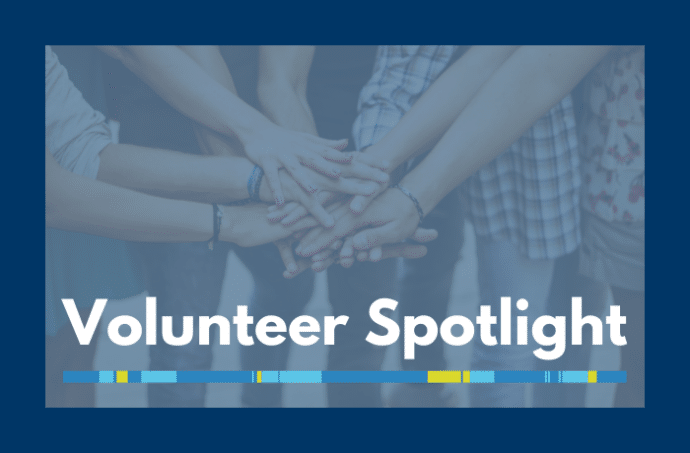
Barb Gregory and The Trevor Project
In our first Volunteer Spotlight, we sat down with one of our legal assistants, Barb Gregory, to learn about her experience working with The Trevor Project, a nonprofit organization dedicated to providing crisis support and other resources for LGBTQ+ youth, and the important role Barb plays as a crisis counselor.
What organization do you volunteer for and what kind of work do they do?
I volunteer for The Trevor Project. The Trevor Project’s stated mission is to end suicide among LGBTQ young people. That means providing emotional and practical support for youth that are in crisis due to their sexual orientation or gender identity. While many resources are available through the website, one of our biggest focuses is telephone and digital counseling for youth in crisis, including youth who are experiencing suicidal ideation. These resources are tailored for LGBTQ+ youth up to the age of 24. That being said, no one is turned away due to age or identity—anyone in crisis can reach out for help.
Why were you drawn to this organization?
I have 2 adult children who identify as transgender, so of course this issue is near and dear to my heart, but I was drawn to this organization before I knew that. Having lost loved ones to suicide, and seeing the widespread mistreatment of LGBTQ individuals, I felt this was an area where I wanted to make a difference. And we say this about so many things—maybe to the point of being cliché—but when it comes to suicide, it really does make a huge difference if you can help even one person.
Why is the work they do so important?
- There is one suicide death in the U.S. every 11.5 minutes. Suicide is the 3rd leading cause of death for 15 to 24 year old Americans.
- LGBTQ young people are four times more likely to attempt suicide than their straight peers.
- Having just one accepting adult in their life can reduce a young LGBTQ person’s risk of suicide by 40%.
- LGBTQ youth who live in a community that is accepting reported significantly lower rates of attempting suicide than those who do not.
- LGBTQ youth are overrepresented among young people experiencing homelessness and housing instability in the United states.
- 14% of LGBTQ youth reported that they had slept away from parents or caregivers because they were kicked out or abandoned, with 40% reporting that they were kicked out or abandoned due to their identity.
If you go to The Trevor Project webpage, the first thing you will see is a pop-up telling you to hit the Esc key 3 times if you need a quick exit. This will not only close the tab but erase it from your browsing history. This feature was created to address the very real threat of punishment or rejection some kids face if their parents see them surfing our site. While we don’t advocate for children lying or hiding things from their parents, the reality is that some kids could be put into a very bad situation just for wanting to talk to someone about their confusing and frustrating feelings. Safe places to talk are absolutely needed.
While incredibly intense, suicidal thoughts do pass. In many cases, having someone to talk to for even a little while in those tough moments can get the person in crisis to a better place where they can think more clearly and positively.
What type of work do you do when you volunteer?
I work as a Crisis Counselor. Youth can reach out via chat, text or phone and talk to one of us any time. Sometimes kids just want someone to talk to about the same stressors everyone goes through—grades, difficult friendships, etc. But many times they are in serious crisis. They can be experiencing severe depression, thoughts of suicide and even physical abuse from parents or others. We make sure there is someone available 24/7 when they reach out. No special degrees are required for this work, but Trevor provides a 30-hour training course.
What has been a highlight of volunteering with this organization?
It feels good when a person starts out the conversation highly upset and eventually says, “Thank you, I feel a lot better.” That happens pretty often, and really, what better feeling could you ask for?
What have you gained/learned from volunteering with this organization?
I have learned so much, mainly that everything I thought I knew about helping people in crisis is wrong! While we don’t want to encourage harmful behavior, it is important to listen to the person who’s contemplating self-harm and validate their feelings. Kids spend a lot of time being told what to do, or that they’re being dramatic. Taking them seriously and resisting the urge to tell them to look on the bright side can really help a lot.
I am amazed at how many times a contact will reach out to me saying they have no idea what to do or where to start, and after asking a couple of questions I find they’ve actually got some really insightful ideas of their own. They’re just so used to being told “You’re just a kid” or “You don’t know what you’re talking about,” that they don’t trust themselves to know anything.
I feel like these concepts are slowly seeping in to how I deal with people in my everyday life. Change is hard, but I’m gradually becoming a better listener with my friends and family, more likely to explore options instead of giving advice.
What kind of volunteer opportunities does the organization have?
The Trevor Project has volunteer opportunities in their Counseling and Research Departments. You can also donate to the work on their website.
To learn more about The Trevor Project and the important work that they do, visit their website.